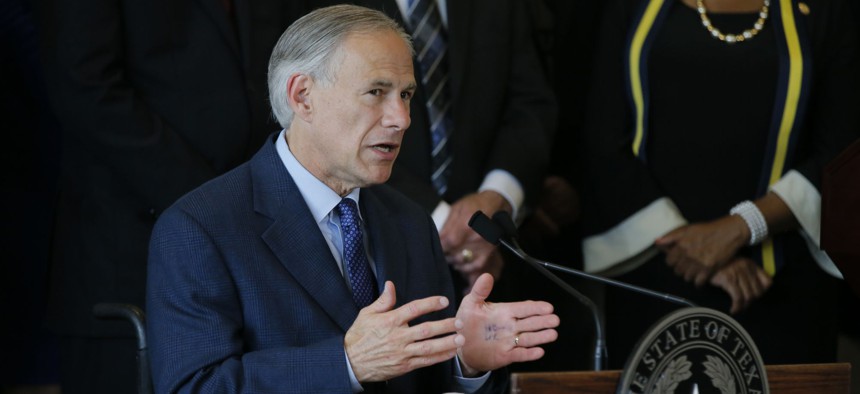Obama Administration Responds to GOP Claims About Unspent Zika Funding

Texas Gov. Greg Abbott Tony Gutierrez / AP File Photo

Connecting state and local government leaders
As the public health situation is “getting critical,” Congress left for a summer break without finalizing a funding package to combat the virus.
As tension builds over federal funding for combatting the mosquito-borne Zika virus, Texas Gov. Greg Abbott fired off a letter to President Obama on Friday saying reports from Congress suggest the White House has about $400 million available to protect Zika-prone states from the disease, and urged the president to dispense that money.
Abbott’s comments echoed those made by U.S. Sen. Marco Rubio, of Florida, a fellow Republican, who suggested last week the Obama administration was sitting on about $300 million, originally allocated for fighting Ebola, which could help pay for near-term Zika costs. U.S. Sens. Ted Cruz, John Cornyn, and every other Republican member of the Texas congressional delegation, raised similar claims in a letter they sent to Obama on Friday.
But a top federal health official outlined last week how the repurposed Ebola funds are already being used.
And Obama himself has warned that money to battle the disease is drying up.
“The money that we need to fight Zika is rapidly running out,” the president said during a press conference last Thursday at the Pentagon, according to a transcript. “The situation is getting critical.”
Concerns about Zika are growing after 16 cases believed to be from mosquitoes in the Miami area were confirmed between July 29 and Aug. 5.
Currently there is not a vaccine available to prevent Zika, which can cause severe birth defects when transmitted from a mother to her fetus. But the National Institutes of Health did announce last week the start of a clinical trial for a vaccine meant to protect against the virus.
The president said that without sufficient funding, work advancing the vaccine could be delayed.
In February, Obama requested $1.9 billion in emergency funding from Congress to combat Zika.
A bill that would have granted $1.1 billion was halted in June by Senate Democrats, who objected to provisions House Republicans inserted. The hot-button provisions had to do with Planned Parenthood, the Confederate battle flag and the Affordable Care Act.
Congressional lawmakers are now on a seven-week recess until September, with many of those up for reelection focused on their campaigns.
A letter U.S. Health and Human Services Secretary Sylvia M. Burwell sent to Rubio last Wednesday offered an update on the Zika funding situation.
Earlier this year, about $590 million of federal funds once allocated for Ebola-related efforts were repurposed for Zika.
But this sum was broken into different parts.
A chunk focused on international Zika response went to the State Department and the U.S. Agency for International Development. And the U.S. Centers for Disease Control and Prevention received $78 million that could only be used abroad.
Dozens of countries in Central and South America have taken the brunt of the recent Zika outbreak.
According to Burwell’s letter, $374 million of repurposed funds were available for responding to Zika domestically in the U.S.
A Department of Health and Human Services spokesperson said by phone Friday that over $200 million of that money had been spent.
The Centers for Disease Control and Prevention, the federal agency primarily responsible for assisting states and localities with Zika prevention and response efforts, received $222 million of the $374 million, Burwell’s letter said.
The letter went on to explain that, as of the beginning of August, the CDC had committed to doling out $123 million of that amount. And it said that the agency plans to allocate “virtually the entire remainder” of the money by the time the federal fiscal year ends on Sept. 30.
The National Institutes of Health, carrying out the vaccine-related work, received $47 million of repurposed funds. Burwell’s letter said this money is set to run out by the end of the month, according to the institute’s estimates.
Another $85 million went to the Biomedical Advanced Research and Development Authority—an arm of Health and Human Services that provides money to the private sector to develop medicines and vaccines. Like NIH, the authority anticipates that the repurposed funding that came its way will be used up by month’s end.
“We have now spent over half of the funding available to protect the homeland,” Kevin Griffis, Assistant Secretary for Public Affairs for Health and Human Services, said in an email Friday. “Without new funding, the NIH and BARDA are expected to run out of money this month, which will halt progress toward a vaccine.”
The request for emergency Zika funding, he added, “has only grown more urgent during each passing day of Congress’ seven weeks of summer break.”
Spraying pesticides to kill mosquitos, testing the insects for Zika, and conducting community outreach, are a few examples of extra costs some state and local governments are facing as they respond to the threat of the virus.
The 16 Florida cases were the only ones authorities had confirmed, as of last Friday, that were thought to have been transmitted by mosquitoes in the mainland U.S.
According to the CDC, there were 1,818 travel-related cases of Zika in U.S. states and the District of Columbia as of Aug. 3, and there were another 5,525 locally acquired cases in U.S. territories.
Bill Lucia is a Reporter for Government Executive’s Route Fifty and is based in Washington, D.C.

NEXT STORY: New Research on Cascadia Megaquake Risks; Oklahoma Counties Lose Out on $192 Million





